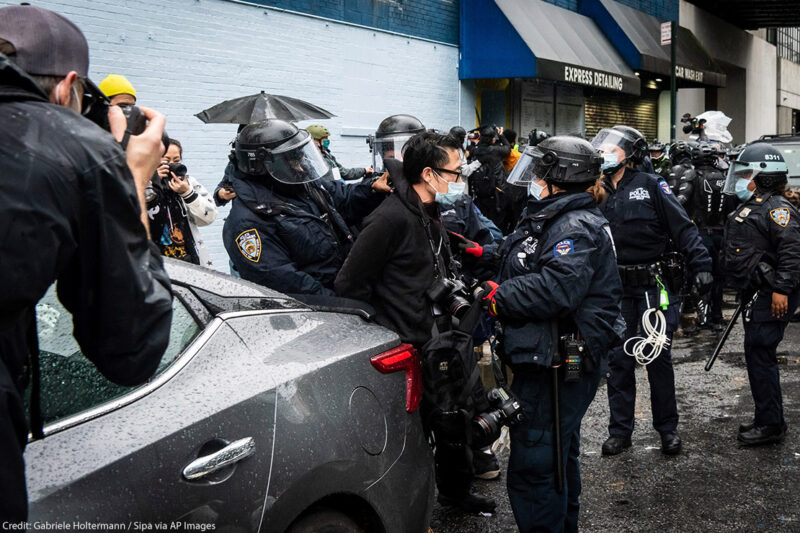Freedom of the Press is Under Attack


During Donald Trump’s presidency, our country repeatedly suffered his administration’s attacks on the First Amendment, including freedom of the press. Now, the Biden administration Department of Justice is quietly taking up the Trump mantle to fight free press, free speech, and government transparency in court.
The U.S. Freedom Press Tracker has documented the recent demise of press freedom, marking an unprecedented year of attacks on press in 2020 during Black Lives Matter and other anti-police violence protests across the country. Last year, the ACLU of Oregon challenged federal law enforcement’s targeting of journalists and legal observers who were documenting the severe violence that local and federal police unleashed on Black Lives Matter protesters in Portland. The ACLU of Oregon and co-counsel from BraunHagey & Borden secured critical judicial orders against the Portland police and federal Department of Homeland Security and U.S. Marshals Service officers that prohibited them from dispersing, arresting, and using excessive force against press and legal observers.
But now, Biden’s lawyers are trying to undo that work while refusing to make any changes to federal policing policy that would ensure journalists and legal observers are protected while documenting police activity at protests. This would be a huge step back in preserving our fundamental right to freedom of the press. This is why the ACLU, the ACLU of Oregon, and partner organizations sent a letter today calling on Attorney General Merrick Garland to permanently adopt protections for journalists and legal observers at protests, and place restrictions on law enforcement’s ability to interfere with journalists and legal observers covering protests.
Freedom of the press is part of the fabric of our democracy. It acts as both a check against government power and a tool for enabling the public to make informed decisions.This is why it’s critical for journalists to have the protections they need to keep the public informed. The ACLU’s letter to Attorney General Garland asks that the DOJ’s Law Enforcement Guidelines for First Amendment Protected Events be updated to include the same basic protections for press and legal observers that the court’s previous order established, including:
- Prohibiting federal officials from arresting, threatening to arrest, or using physical force against any person whom they know or reasonably should know is a journalist or legal observer, unless there is probable cause to believe that person committed a crime.
- Not requiring journalists and legal observers to disperse following a dispersal order, even though they are bound by all other laws and may not interfere with law enforcement’s lawful activities.
- Prohibiting federal officials from ordering any journalist or legal observer to stop recording, photographing, recording, or observing a protest, unless that person is arrested based on probable cause.
The ACLU of Oregon’s lawsuit seeks to protect the public’s ability to know what its government is doing when it chooses to use violence on its own people. It was one of many lawsuits that flooded the courts last year, from Portland to Minneapolis to Indianapolis to Seattle, as police responded to calls to end police violence with more police violence. The ACLU of Oregon lawsuit is one of four cases that the ACLU of Oregon filed against federal law enforcement in Portland alone.
While the Biden administration has publicly extolled the importance of freedom of the press to our democracy, counsel for the federal government in these cases began trying to dismiss our clients’ claims from court and explicitly defending the Trump administration’s policing of the protests and the policies that guided it. The DOJ maintains that even though it refuses to make any changes to how federal officers police protests — and seeks to preserve law enforcement’s ability to violently disperse reporters and legal observers trying to cover the protests — the claims are now “moot” because our clients no longer face a substantial risk of harm given changes in federal leadership and in the tempo of Portland protests. Rather than coming to the table to seek resolution with our clients, they seem to want to rest easy behind the facade of: New President, who dis?
The Biden DOJ’s choice to resist accountability for the Trump administration’s racism and brutality in court, while lauding its own small acts of doing the right thing, does nothing more than maintain the status quo of decades of harmful federal policing. Forgive us, Mr. President, if we do not find comfort in the “just trust us” approach.
If the Trump era taught us anything, it was that protecting our most basic human rights requires tight reins on law enforcement, independent of the whims of leadership. If our country’s broader history has taught us anything, it is that Black lives will not be safe if American society continues its reliance on broad police authority for our general welfare. George Floyd’s murder being captured on camera underscores the importance of being able to document police violence and abuse. We call on Attorney General Garland and the Biden administration to take responsibility for the violence of our federal agencies, review their policies, and rewrite them so that what happened last year to protesters and press never happens again.
UPDATE 9/30/21: In response to our letter, Senators Wyden, Merkley, Booker, Ossof and Van Hollen sent a collective letter urging the DOJ to protect journalists' First Amendment rights, including urging the DOJ to permanently adopt protections for journalists and legal observers at protests in the DOJ’s Law Enforcement Guidelines for First Amendment Protected Events.
